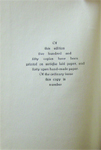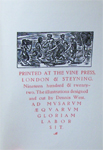100th
MP

|
THE
100th
MONKEY
PRESS |
|
|
|
Limited Editions by Aleister Crowley & Victor B. Neuburg |
|
Bibliographies |
|
Download Texts
»
Aleister
Crowley
WANTED !!NEW!!
|
|
LARKSPUR |
|
Image Thumbnails |
||||||||||||||||||||||||||||||||||||||||||
|
Title: |
Larkspur: A Lyric Garland |
Upper Cover
Lower Cover
Spine
Title Page
Limitation Page
Vine Press
|
||||||||||||||||||||||||||||||||||||||||
|
Variations: |
|
|||||||||||||||||||||||||||||||||||||||||
|
Publisher: |
The Vine Press. |
|||||||||||||||||||||||||||||||||||||||||
|
Printer: |
Vine Press. |
|||||||||||||||||||||||||||||||||||||||||
|
Published At: |
London and Steyning. |
|||||||||||||||||||||||||||||||||||||||||
|
Date: |
1922. |
|||||||||||||||||||||||||||||||||||||||||
|
Edition: |
First Edition. |
|||||||||||||||||||||||||||||||||||||||||
|
Pages: |
xii + 101. |
|||||||||||||||||||||||||||||||||||||||||
|
Price: |
|
|||||||||||||||||||||||||||||||||||||||||
|
Remarks: |
Original woodcut illustrations were designed and cut by Dennis West. Printed by hand on Victor Neuburg’s printing press. The “Dedication”, “Prologue”, “Epilogue”, “Colophon”, and the poems signed “Christopher Crayne”, “Paul Pentreath”, “Harold Stevens”, “Laurence Edwardes”, “Arthur French”, and “Nicholas Pyne” are by Victor Neuburg. |
|||||||||||||||||||||||||||||||||||||||||
|
Pagination: |
|
|||||||||||||||||||||||||||||||||||||||||
|
Contents: |
- Dedication - Prologue - The Countryman’s Delight: Tom D’Urfey - Canticles: John Norris - Doron and Carmela: Robert Greene - The Milkmaid: Dr. James Smith - Sharing Eve’s Apple: John Keats - The Amorous Shepherdess: Christopher Crayne - The Invitation: Aphra Behn - Johnny and Jenny: Edward Moore - The Ballad of Lyonesse: Paul Pentreath - I Mun be Married a Sunday: Nicholas Udall - Madrigal: William Drummond - An Apology for Having Lov’d Before: Edmond Waller - The Yellow Moon: Harold Stevens - Giles and Jillie: Laurence Edwardes - Bowpots: Arthur French - Trollie-Lollie: Nicholas Pyne - Epilogue - Colophon |
|||||||||||||||||||||||||||||||||||||||||
|
Author’s Working Versions: |
|
|||||||||||||||||||||||||||||||||||||||||
|
Other Known Editions: |
||||||||||||||||||||||||||||||||||||||||||
|
Reviews: |
I don’t know that countrymen are more jolly than townsmen, but they are always so in poetry. There they live chiefly on good brown ale, dancing under the greenwood tree, kissing milkmaids and singing ditties to fair shepherdesses. It is a good life and a gay one. Innocently followed, it should lead to rubicundity and lamb’s-wool sidewhiskers with a place of honour in the village taproom. This spirit of fun and jolly, careless pleasure, touched with broad and simple humour, is found in most of the pages of this little anthology. Its editor as ranged far and wide in his selection, going back to the work of Nicholas Udall (1504-1556) the Eton schoolmaster who wrote the first English comedy, “Ralph Roister Doister,” and quoting other poets whom I cannot trace, but who are in the spiritual succession. One of the merriest of all the songs is “The Countryman’s Delight,” by Tom D’Urfey (1658-1723) who was full of good humour and jolly comedy. His poem is delicious and should be washed down with a pot of beer before a blazing open fire upon a winter’s night. Best of all, perhaps, is the fresh and playful “Sharing Eve’s Apple,” by John Keats—the young, fanciful, madcap Keats who was not often seen in the later poems. Edmund Waller (1606-1687), the turncoat Cavalier poet, is here and Robert Green (1560-1592) gives us a fine piece of tomfoolery, whilst William Drummond of Hawthornden, bows rather stiffly. All the book makes a townsman pine for smock and gaiters. It is beautifully produced in a limited edition on “antique” paper and the letterpress is enlivened by quaint woodcuts, designed and cut by Dennis West. It has a dedication, prologue, epilogue and colophon which are too deep for me, but seem to be well-meant. Every country house near should have a copy and leave it by a window seat. It is more beautiful than even a Bradshaw, if not so impressive as a Brett’s. —The Worthing Herald, 14 April 1923. ______________________________
This Garland of little-known love lyrics, artistically printed and embellished with cuts by Dennis West, is worth possessing. The lyrics, by such poets or rhymesters as Nicholas Udall, William Drummond, Robert Greene, Edmond Waller, Aphra Behn, Tom D’Urfey, and Keats—to name about half the authors on whom levy is laid—are often outspoken on certain aspects of the softer passions, but they are always natural and gay, and their lyricism is indubitable. From this last point of view the contention of the prologue, that the songs are “the word of the gods to an,” is sound. —The Aberdeen Press and Journal, 30 January 1923. ______________________________
To catholicity of taste “Larkspur: A Lyric Garland” (The Vine Press, Steyning: 6s. net) should be a new nectar. This collection of poesies is of interest from the dedication to the end. One instinctively looks for artistic productions from the Vine Press; in “Larkspur” the artistic that is bizarre holds place. The poetry ranges from the playful jingling of a piece attributed to Dr. James Smith to a sonorous madrigal by William Drummond. Erotic passion is found in many pieces, others are as swallows skimming over the deeps—trifling with the greatest passions, treating wickedness happily rather than making virtue a thing of misery—“O cut the sweet apple and share it” is the burden of John Keat’s “Sharing Eve’s Apple”—and we fancy that the reader as he reads on is glad that the poets have been induced to cut their sweet apples and share them. There is a wonderful lilt in “The Country Man’s Delight” (Tom D’Urfey), and John Norris’ Canticles enchant by their simplicity. “Doron and Carmela” has given Mr. Robert Green opportunity for some strange similes—contrast these with any others that you may fancy—“Thy breath is like the steam of apple pies; Thy lips resemble two cucumbers fair; Thy teeth like to the tusks of fattest swine; Thy speech is like the thunder in the sky; Would God thy toes, thy lips, and all were mine.” Aphra Behn has a pretty song, “The Invitation,” albeit somewhat sensual; “Johnny and Jenny” (Edward Moore) is the same. An expression in “The Ballad of Lyonese” perhaps fits Paul Pentreath, the writer. Nicholas Udall employs an old but none the less pleasant poetic device in “I mun be married a Sunday” to secure effect. The dedication, epilogue, and colophon are tastefully in keeping with the general note of the anthology. A number of woodcuts by Dennis West illustrate the book, and as such they are well done. —The Worthing Gazette, 18 April 1923. ______________________________
Occasionally—at intervals far too long, alas!—there reaches the sad groaning tables of reviewers a little volume whose charm and distinction brings with it the freshness and surprise of a May Queen dancing into a committee meeting of frowsy kill-joys or a jolly young Bacchus raiding the headquarters of the Pussy-foots. There have only been five of these occasional volumes, including a sort of distant relative which, being outside the series, I do not mention here. They come modestly into the world, receive a really notable appreciation from some of our few discriminating reviewers, and pass, no less modestly, into, I imagine, the goodly company of books kept by our connoisseurs. For modesty is the one natural raiment of these volumes. The title-pages bear the imprint “The Vine Press, Steyning,” which is just sufficient to tell you whence, in Sussex, you may secure copies. Indeed, beyond that, in none of them except the “distant relation” and the fifth shall you find any clue as to authorship or editorship. On the other hand, you will not need to look over many pages to find verses of perfect and captivating tune—idylls that make the pipes of Pan flute again over the years that are still. Much of the verse is the work of a poet who can express himself in a fine lyric measure, of one who is steeped in folklore, and of one who can distil the golden classics not merely as a translator but as a creative artist; the remaining verse, some of it little known and precious, is by poets with similar qualities, the selection showing a very extensive sympathetic knowledge. The first of these volumes was Lillygay, an anthology of anonymous poems which a writer in an early November Number of The Bookman’s Journal hailed as “a benediction of a book—a book eternal” in whose pages the reader might “re-capture lost May Days and lost pay-days.” Nest, a year later, appeared the anonymous Swift Wings: Songs in Sussex, containing some rich melodies which more than maintained the promise of the original work in the previous volume and augured well for the future. Songs of the Groves, the successor (1921), was in some ways a more ambitious work, in which the author, still veiling himself, in achieving some finer moments in his songs and translations frequently ran the full course of his unrestrained themes of Arcadian loves and passions. The latest volume is Larkspur: A Lyric Garland, by various hands. These books are issued in certified ordinary editions of 550 copies, each numbered, printed on antique laid paper, for a few shillings each; with editions de-luxe limited to 40 copies on handmade paper, the woodcut decorations hand-coloured, numbered and signed. There is a very individual note in the production of these books, and though they offer points for typographical criticism, the founts of type used and the arrangement are in effective harmony with the verse. The woodcuts, variously by Eric and Percy West, are crude (though better in some of the later examples), but there is character in them which makes their very crudeness delightful. Altogether, one feels in handling the volumes that they have been dreamed over, and planned, and dreamed over again: they are instinct with the spirit of the verse of the Dedication in Larkspur—
So to the Rose of Beauty, The Heart in each Star impearled, Is sung the Artist’s duty, The Poet’s love for his world.
As for Larkspur, the recent publication of which is the occasion for the above notes, this book is a departure from the previous ones in the series. An anthology, the poems—with the exception of the Dedication, Prologue, Epilogue and Colophon—are this time ascribed, the “contributors” being given as Tom D’Urfey, John Norris, Robert Greene, Dr. James Smith, John Keats, Chrystopher Crayne, Aphra Behn, Edward Moore, Paul Pentreath, Nicholas Udall, William Drummond, Edmond Waller, Harold Stevens, Laurence Edwards, Arthur French, and Nicholas Pyne. Now, there are some names here that we know well enough; but there are others for which we may search the British Museum until we tread on our beards without ever tracing the authors and their alluring lines. I would fain pursue this matter now, but I leave it until I have more space and liberty. Keats? I wonder how many lovers of Keats know a five-stanza poem credited to him, “Sharing Eve’s Apple,” whose last verse is:—
There’s a sigh for yes, and a sigh for no, And a sigh of I can’t bear it! O what can be done, shall we stay or run? O cut the sweet apple and share it.
Larkspur, with its known and unknown singers, is a book to transport the reader to the woods and their spirits
Rose-leaves rustle And poppy-leaves fall; Oak-boughs tussle And rude rooks brawl
And to far-off things which are the best things and near enough for those who sing with “The Amorous Shepherdess” (by Chrystopher Crayne)
O come my deare! Thy Love is here, And waits the silver straines Of thy sweete Pipe Nowe Sprynge is rype, Come with the firste new Raines.
There is no better recommendation than to say that Larkspur will go with its predecessors to join the goodly company of books sought by those who delight in these “Songs of ripe-lipped love and of honey-coloured laughter: old lamps for new: ancient lights.” —The Bookman's Journal, March 1923. |
|||||||||||||||||||||||||||||||||||||||||




